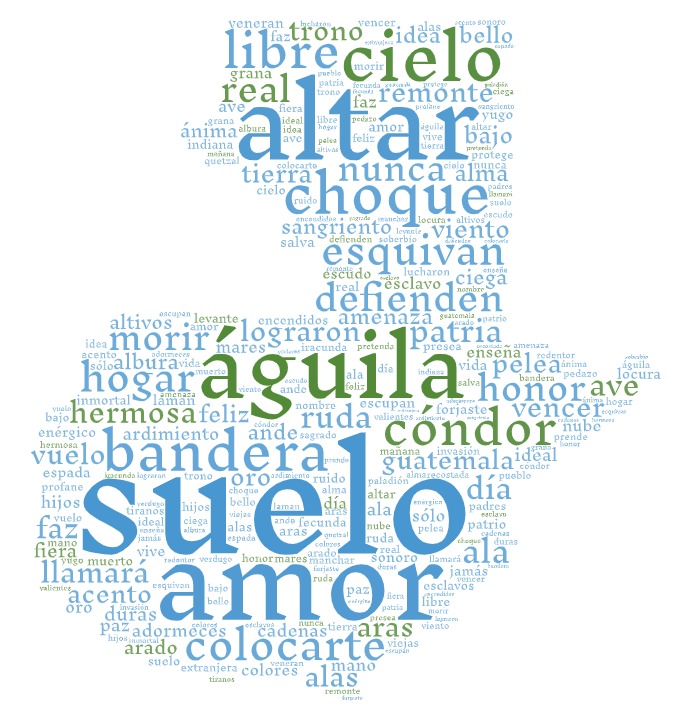
Length: 285 words
Anthem lyrics (use the arrow on the left to collapse this section):
¡Guatemala feliz…! que tus aras
no profane jamás el verdugo;
ni haya esclavos que laman el yugo
ni tiranos que escupan tu faz.
Si mañana tu suelo sagrado
lo amenaza invasión extranjera,
libre al viento tu hermosa bandera
a vencer o a morir llamará.
Libre al viento tu hermosa bandera
a vencer o a morir llamará;
que tu pueblo con ánima fiera
antes muerto que esclavo será.
De tus viejas y duras cadenas
tu forjaste con mano iracunda
el arado que el suelo fecunda
y la espada que salva el honor.
Nuestros padres lucharon un día
encendidos en patrio ardimiento
y lograron sin choque sangriento
colocarte en un trono de amor.
Y lograron sin choque sangriento
colocarte en un trono de amor,
que dé patria en enérgico acento,
dieron vida al ideal redentor.
Es tu enseña pedazo de cielo
en que prende una nube su albura,
y ¡ay de aquel que, con ciega locura,
sus colores pretenda manchar!
Pues sus hijos valientes y altivos,
que veneran la Paz cual presea,
nunca esquivan la ruda pelea
si defienden su tierra y su hogar.
Nunca esquivan la ruda pelea
si defienden su tierra y su hogar,
que es tan sólo el honor su alma idea
y el altar de la patria su altar.
Recostada en el ande soberbio
de dos mares al ruido sonoro,
bajo el ala de grana y de oro
te adormeces del bello quetzal.
Ave indiana que vive en tu escudo
paladión que protege tu suelo;
¡ojalá que remonte su vuelo,
más que el cóndor y el águila real!
¡Ojalá que remonte se vuelo,
más que el cóndor y el águila real,
y en sus alas levante hasta el cielo,
Guatemala, tu nombre inmortal!
Historical context:
As was the case in other countries such as Mexico, Guatemala’s current national anthem was not the first one selected. The country chose its first anthem in 1888, after holding a competition to choose the music to accompany a pre-selected text. Unfortunately, the lyrics met with a lukewarm reception from critics and officials and the song did not last.About a decade later, the government tried again with a second competition. This time, an anonymous participant won, submitting new lyrics for the same music from the 1888 anthem (composed by Rafael Álvarez Ovalle). The selection of the same music twice raised complaints of possible foul play, however, and the government decided to hold a third competition. The same piece won again, by a unanimous vote. Curiously, the author of the lyrics (José Joaquín Palma, a Cuban poet) preferred to remain anonymous until he was on his deathbed in 1910.
The current lyrics date to 1934, when the government determined that some of the original text was too “warlike” and ordered their modification.
The structure of the song is also somewhat unique. There is a chorus, but its lyrics vary. Instead of repeating the same lines over and over, the anthem’s chorus consists of repeating the last two lines of the preceding verse as the first two lines of the following verse, e.g.:
Si mañana tu suelo sagrado
lo amenaza invasión extranjera,
libre al viento tu hermosa bandera
a vencer o a morir llamará.
Libre al viento tu hermosa bandera
a vencer o a morir llamará;
que tu pueblo con ánima fiera
antes muerto que esclavo será.
Performance: